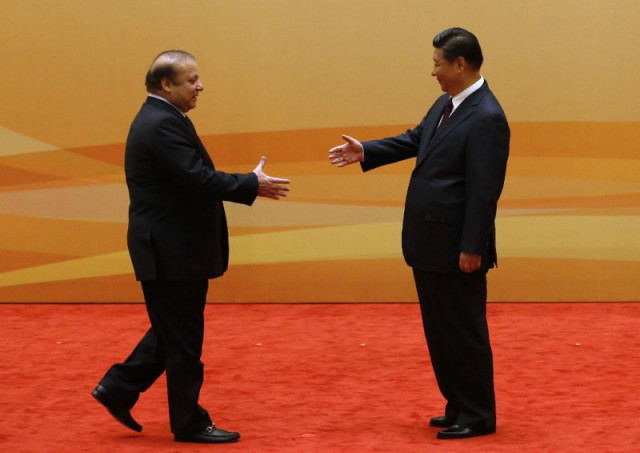Four reasons why CPEC will not be another East India Company
Concerns regarding the economic corridor are understandable but to suggest it’s similar to EIC is farfetched

Prime Minister Nawaz Sharif meets Chinese President Xi Jinping. PHOTO: REUTERS
The concerns regarding CPEC are understandable given our history and we should be raising important questions as to who will be the primary beneficiary of the project. However, to suggest that CPEC is similar to or would eventually turn into another EIC is farfetched and seems unlikely for a couple of reasons.
Different economic policies
First is the difference between the economic policies of the imperial Britain and the People's Republic of China.
Balochistan agrees on tax breaks for domestic investors
Adam Smith, a Scottish philosopher and pioneer of political economy, summed up the philosophy of mercantilism as “all for ourselves and nothing for other people... has been the vile maxim of the masters of mankind”. The masters he is referring to is, of course, the British who pursued the economic policy of mercantilism from 16th to 18th century, of which EIC was just a small manifestation.
Mercantilism basically provided for accumulation of wealth by extracting raw material and other such resources from the colonies and exporting manufactured products back to the colonies. This economic exploitation and accumulation of wealth without any regard for the well-being of the local population was at the heart of EIC ideology.
On the other hand, China adheres to no such maxim. In fact, China itself has a history of being victim of imperialist aggression.
Although it ostensibly is a communist country, practically the Chinese state functions through the principles of capitalism. While it is true that under capitalism, the primary purpose of enterprise is to make profits and not some altruistic goals to serve others, it is fundamentally different from “All for us, nothing for them” approach. It rests on bringing some amount, if not the ideal amount, of economic prosperity to the indigenous population in order to bring stability and sustainability.
China in Africa
Secondly, we might be able to better understand how China operates by looking towards its involvement in other regions, specifically Africa. While EIC cemented its power in the sub-continent through brutal force and no regard for the well-being of local population, China’s approach has been to expand its influence around the globe through economic prosperity rather than military might.
China has been contributing to Africa’s economic growth, both in terms of trade and with building infrastructure. All over the continent, it has built roads, railways, ports, airports, and more, filling a critical gap that western donors have been shy to provide just as in the case of Pakistan.
The concern that CPEC will strictly create jobs for Chinese nationals can be answered by the fact that rising Chinese wages in certain sectors may lead to Chinese manufactures to export jobs to Pakistan if it can find cheaper labour. One such example is Zambia, where some 300 Chinese companies now employ around 25,000 people. Ethiopia’s shoemaking sector has also benefitted from Chinese investment that has created jobs and exports. Likewise, according to government estimates, CPEC will create around 2 million new jobs directly and indirectly.
Pakistan is no ‘golden sparrow’
A third reason why CPEC is different from EIC is that there was no yearning for foreign investment at the time by the Mughals when EIC worked its way in. In fact, it was the other way around, as the British had their eyes on the riches of the sub-continent, whose share of the world income stood at 27% in 1700 AD (compared to Europe's share of 23%) - which plummeted to 3% in 1950 when the British finally decided to leave.
CPEC challenge and opportunity
However, prior to the investment that CPEC brought in, Pakistan was no ‘golden sparrow’ for China to eye. Along with its dwindling economy, massive energy shortages, grave security concerns, Pakistan had an image problem which had kept foreign investment far away from reach hence the need is Pakistan’s.
Just consider that CPEC investments, spread over 15 years, will bring a total of up to $51.5 billion; around $35 billion on the energy front in an Independent Power Producers mode and the balance going to infrastructure development. This is likely to increase Pakistan’s GDP from 4.7 per cent to around 6 per cent by 2019.
Local checks and balances
Fourth are the checks and balances which formal institutions such as courts and regulatory authorities will provide. While Pakistan might not possess ideal institutional checks and balances, however, it does retain a fairly independent political and institutional structure which did not exist in colonial period.
Consider just a few examples: National Electric Power Regulatory Authority’s disapproval of Chinese investors’ demand for an increase in power tariffs; the Supreme Court’s rejection of a Chinese company’s plea to be allowed to participate in the bidding process for the Dasu Hydropower Project, and a local court’s ruling barring a Chinese firm from controlling Sost dry port. This shows that China’s influence is neither absolute nor arbitrary as was the case with EIC. Mughal emperors did not enjoy any of these advantages with the highly assertive EIC.
Whilst the likelihood of another EIC in this modern age and time seems unlikely for the reasons discussed above, it does not mean that important questions regarding the transparency and effectiveness of the project should not be asked because it is awareness in the masses that serves as the most potent force which will ensure that CPEC will not become another mechanism of economic exploitation.
Saad Ahmed Dogar is a lawyer based in Lahore


















COMMENTS
Comments are moderated and generally will be posted if they are on-topic and not abusive.
For more information, please see our Comments FAQ